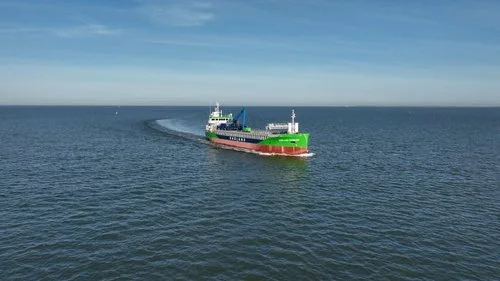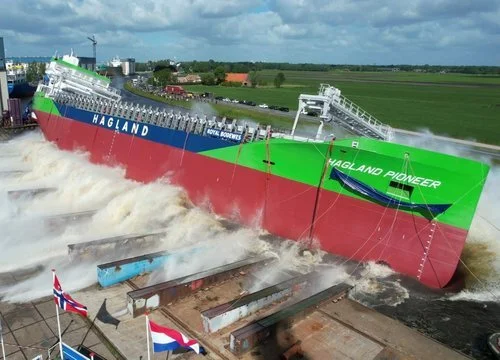Lighter Weight Systems, Higher Energy Density, Smaller Modules are Significant Steps in Battery Technology Progression - MBF Member, Walter van der Pennen (EST Floattech)
What is the current progression rate of maritime battery adoption? Who are the key players? How can stakeholders in the maritime battery value chain contribute their quota? In this interview, Walter van der Pennen, Commerical Director for Dutch battery manufacturing company, EST-Floattech, presents their new battery series, ideas for faster adoption of battery technology and the importance of an all round approach.
MBF - Please introduce yourself and your company
Walter van der Pennen - I am the Commercial director for EST-Floattech
MBF - What does your company do?
W.V.P - EST-Floattech is a Dutch company that develops, produces, and commissions maritime battery solutions. We have production facilities in the Netherlands. During the process, we actively support our (potential) clients from their request until the successful operation of their vessel. With our new Octopus platform we have an optimal and safe battery solution for every maritime application. From fast charging to containerized and from high energy to flexible and modular battery rack layouts.
Our recent projects include Kotug E-Pusher 1, Hagland Coasters, Riveer, retrofitted ferries in Scandinavia, and more.
MBF - How does your job relate to maritime batteries?
W.V.P - The commercial team needs to translate the customer requirements and needs into an optimal battery solution for their ship. We invest in longlasting relationships and support our customers from initial concept design until the vessel is in operation. I support the sales team in selling battery systems, maintain contacts with our customers, and make sure we are aware of different projects worldwide on which shipyards or owners want to place a battery system on board. I’m very proud to be leading this ambitious and close team of sales, sales engineers and marcom professionals.
MBF - What drew you to maritime batteries?
W.V.P - With an educational background in sustainable energy technologies and the love for the maritime sector I’ve always been involved in projects to make ships more efficient and emit less emissions. I started at a well known system integrator and started 6 years ago at EST-Floattech.
I really believe that battery technologies have an important role in the energy transition of our industry. Further, we are working with a dedicated team to grow EST-Floattech which is very satisfying and fun.
MBF - What has been your favorite maritime battery project that you have been involved with?
W.V.P - There are many which I’m very proud of but if I need to pick one this it would be the series of 3 hybrid coaster built at Royal Bodewes for Hagland shipbrokers. It started by a pioneering customer who wanted to sails zero during port calls and safe emissions. Together with the shipyard and system integrator we calculated several scenarios to define the optimal battery system. Finally to sail with such a vessel solely battery powered out of the harbour is spectacular.
Lately the third vessel is christened and the vessel are performing according to plan.
This really was a lighthouse project as at this moment we see many cargo ships being equipped with a battery system
EST-Floattech - Royal Bodewes_Hagland Pioneer
MBF - How long have you been a member at the MBF?
W.V.P - We have been a member of the Maritime Battery Forum for 5 years
MBF - Why do you think companies should become a member of the MBF?
W.V.P - Companies should consider joining the MBF for the valuable networking opportunities, access to the latest industry insights, and the overall collaborative efforts towards shaping a more sustainable future with maritime batteries.
MBF - Looking back at developments in battery technology over the last ten years, what for you could be considered the most significant steps in the right direction?
W.V.P - Over the past decade, significant strides in battery technology have been made, such as the lighter weight of systems, higher energy density, smaller size of the modules but most developments we have seen in the safety of the battery systems.
In our case, this has resulted in our recently launched Octopus Series battery system, which is safer, lighter, has better performance, and is modular, so it can be designed to fit any requirement. Also, interest has increased in the maritime industry. Shipyards, shipowners, system integrators, and other relevant players are now looking toward implementing batteries as a solution to lowering CO2 emissions.
MBF - What do you think is the future of batteries in the maritime industry?
W.V.P - The future of batteries in the maritime industry holds great promise, with an increasing focus on combining technologies for alternative fuels. But also increased battery performance, ensuring more ships will sail fully electric.
MBF - What, in your opinion, are some of the biggest challenges to the maritime battery industry?
W.V.P - Some of the biggest challenges include the costs of producing batteries; the investments are higher at the beginning compared to fossil fuel propulsion. Although there is less maintenance needed and the batteries of EST-Floattech have an estimated life time of about ten years.
The current geopolitical situation is also a challenge, as a lot of people are conservative about making large purchasing decisions, including battery systems. Finally, we as an industry should take care that we deliver what we promise so that we become a trusted and reliable solution for vessel owners.
MBF - Where do you see the Maritime Battery Forum in the next five years?
W.V.P - In the next five years, I envision the MBF as a leading platform that not only shows vessels that sail with batteries but also predicts market growth. The MBF will also be a place where buyers or people who are interested in batteries for their vessels come to search for relevant knowledge. WATTS UP will become a larger conference and exhibition relevant to key leaders in the maritime industry


